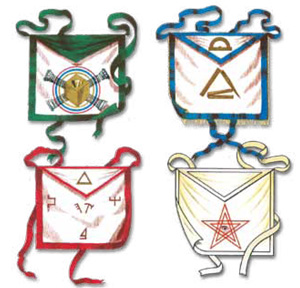How can ordinary people make a difference in the future? How can we do things which will outlive us?—5°, Perfect Master
What is the difference between anger and outrage? Are there circumstances in which outrage is morally justified? Can one serve as a peacemaker while feeling outraged? What is the role of the peacemaker?—6°, Confidential Secretary
We live together in society. We are members of a civil community. Humans are social creatures. We are not meant to live alone and in isolation. Yet, with so much hatred and conflict in the world, it is easy to want to live away from all the torment and disillusionment. Why is this not a good solution? How do we reconcile the ideas of individualism and freedom with community and morality?—12°, Master Architect
What is the difference between religion and philosophy? When are these schools in opposition with each other? When are they in harmony?—27°, Knight of the Sun
If these questions intrigue you, if you believe they embrace concepts worthy of study and reflection, if you see yourself as one who would enjoy personally examining ideas like these, then you may want to enroll in the College of the Consistory. It is a program that asks over 300 such questions. And each is addressed in the 29 degrees of the Scottish Rite.
In 2003, the Valley of Guthrie, Oklahoma, established the College of the Consistory to enhance the Rite’s position as the “University of Freemasonry.” Like the Supreme Council’s Master Craftsman program, it has grown into a popular national program of Scottish Rite Masonry.
The emphasis of the College of the Consistory is individual self-study. The course is an at-home curriculum which offers the brother the opportunity to study the major ideas and themes outlined in the degrees of the Rite at his leisure. The course provides multiple choice exams over the four bodies of the Rite, a written synopsis of each degree and a syllabus of questions, ideas, and themes concerning the degree from which the student writes an essay or research paper. He progresses in the College at his own pace. All essays are graded by the Board of Adepts of the College. The Adepts are brothers who have already completed the process of self-education for themselves. Exams and peer reviews give each enrollee a method of checking his own proficiency and progress in the work.
The College is designed to transform the student of Masonry into a teacher of the Rite in his own valley. His self-work toward this goal aids immeasurably in giving him the confidence he needs to succeed at the task.
The fact is there is much more to the Scottish Rite than can be learned and remembered in one experience. We need time to reflect and think, to see relationships in the information presented; to learn about the degrees we did not witness. When we get home from such an experience, we are usually left only with some reading resources and an aching desire to go to work as 32° Masons. All of us can use help in facilitating our response to and understanding of the Rite. The College of the Consistory was established to provide a venue whereby Scottish Rite Masons can better use the teachings of the Rite as a lifelong learning tool.
There are several tangible benefits of being an enrollee in the college. The Guthrie College posts the best essays written by College members in an encrypted area of the Guthrie Valley’s website. Each enrollee can access the site and build his own file of knowledge about the degrees. He benefits not only from his own work, but also the shared work of others. Further, the Guthrie Valley assists those who become adepts in creating meaningful Scottish Rite education programs in their own valley. It is difficult for one to graduate from the College of the Consistory without a substantial understanding of the themes, quests, and meanings of the degrees.
The Guthrie program is available to any 32° Mason who belongs to a valley considered regular and in amity with the Mother Supreme Council of the World. To enroll, go to http://www.guthriescottishrite.org and check the “consistory” icon.
Currently, there are over 900 members in 48 states and 10 foreign countries enrolled in the College. There is no charge. Guthrie facilitates the program since it developed the curriculum. All valleys are encouraged to establish campuses through the College so local enrollees, regardless of valley affiliation, can meet together for festive boards, discussions of papers, degrees, and ideas relevant to Freemasonry.
Again, the whole intent of the College is to affirm and document that the Scottish Rite is indeed the “University of Freemasonry.” The idea is to create a dynamic where men are encouraged to learn and become teachers of Masonry themselves—a place where the Scottish Rite adds to their understanding of things important to their own sense of being in the world. We hope to hear from you soon.







